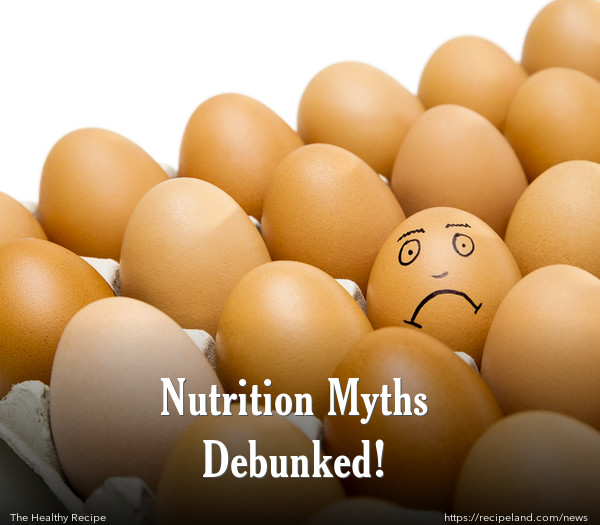1. Eating eggs will drive up your cholesterol.
We have been told that egg yolks and whole eggs are dangerous because they contain cholesterol, which will clog your arteries and lead to heart disease or stroke. Egg whites are okay, because they are low in fat and cholesterol free.
However, not all cholesterol is the same. Eggs have dietary cholesterol, which is not the same as the cholesterol that builds up in your bloodstream and blocks your arteries. Actually, eggs raise the amount of good cholesterol in your body and have little to no effect on your bad cholesterol levels. Bad cholesterol is related to the amount of saturated and trans fat you eat. Eggs only have a little bit of saturated fat.
Eggs are full of choline to improve brain health. They also contain vitamins, minerals, antioxidants and healthy protein.
2. Saturated fat is bad for you.
Not all saturated fats are the same. In fact, there are many different kinds of saturated fats and each of them are uniquely processed by the body.
For example, stearic acid is a saturated fat that naturally occurs in foods like poultry, coconut oil, dairy products, meat, and cocoa. Stearic acid has been shown to raise good cholesterol levels and have no impact at all on bad cholesterol levels. Some saturated fats are able to change dangerous small, dense LDL (or bad) cholesterol into benign, large LDL cholesterol.
3. Avoid salt like the plague.
Seasoning your food with salt will not raise your risk of heart attack or stroke, unless you have a medical condition that requires you to be on a salt-restricted diet. The general public can safely season their food with moderate amounts of salt without experiencing greater risk of cardiovascular disease.
In fact, adding salt to cooking water can prevent the loss of valuable nutrients as they leach into the water. Plus, the amount of salt that is actually absorbed by foods that have been cooked in moderately salted water is almost non-existent!
4. Stick to a low-fat, high-carb diet to lose weight.
Research has not shown any link between a low-fat, high-carbohydrate diet and long-term weight loss success. This type of diet is also not effective to prevent diseases such as cancer or heart disease, according to the Women’s Health Initiative. The Women’s Health Initiative found that diets low in saturated fats and high in fruit, vegetable, and grain-based carbohydrates do not show any significant lowering of the risk for developing cardiovascular disease, coronary heart disease, or stroke.
5. The caffeine in coffee makes it bad for you.
While coffee does have high levels of caffeine, it also has incredibly high levels of antioxidants. Studies reported in both the European Journal of Clinical Nutrition and The Journal of Nutrition have found that coffee gives you more antioxidants than eating the recommended amount of fruits and vegetables. Plus the antioxidants in coffee can reduce your risk for developing Alzheimer’s disease, type-2 diabetes, and depression.
6. Too much protein will damage your kidneys.
Unless you have been diagnosed with kidney disease and placed on a protein-restricted diet, you do not need to worry about the effect of protein on your kidneys. You might have heard that eating a high-protein diet will stress out your kidneys and put you at a higher risk for developing kidney disease.
However, many studies have found that high-protein diets are safe for healthy people. Eating reasonable amounts of protein can prevent type-2 diabetes, reduce blood pressure, and help you lose weight! Obesity, type-2 diabetes, and high blood pressure are all risk factors for kidney disease.
7. Eating full-fat dairy products will make you fat.
Full-fat dairy products, like milk, butter, yoghurt and cheese, should be avoided because they are packed with calories and saturated fat, right? Wrong! Research has shown that eating moderate amounts of full-fat dairy products can help you lose weight without increasing your risk for heart disease.
A study reported in The American Journal of Clinical Nutrition found that those who eat full-fat dairy products from grass-fed cows are at a 69% lower risk of developing heart disease. The milk of grass-fed cows has higher concentrations of conjugated linoleic acid, which is linked to a reduced risk of heart attack.
8. Low-fat foods are good for you.
Low-fat foods are not automatically healthy. Even though we have been taught that the words “low-fat” on the label point to a healthy option, this just isn’t so. Many of low-fat foods are packed with sugar to cover their bland taste. This is especially true of highly processed low-fat foods and foods that are not naturally low in fat. In reality, the added sugars are more dangerous than naturally occurring fats.
9. All calories are created equal.
The way your body burns or stores calories depends on what types of foods they come from. Just cutting calories in general will not necessarily help you lose weight. The body controls your appetite and hunger based on the type of calories you have eaten.
One study found that those who eat a high-protein diet consume 441 fewer calories per day than those who follow lower-protein diets. They also experienced an increased metabolism and felt less hunger. Just adding calories from protein, without making other changes, helped them lose almost one pound a week. Other types of food are processed by the body differently, affecting feelings of fullness and metabolic rates. The point is that not all calories are the same, and they shouldn’t be treated that way.
10. Cooking with olive oil ruins its benefits.
Olive oil is full of good fats that are not damaged by heat, even the delicately flavored extra-virgin olive oils. As long as you keep olive oil below the smoking point, 405 degrees F, their heart-healthy monounsaturated fats and phytonutrients are not altered.
What you need to worry about is how you are storing your olive oil. Its phytonutrients and healthy fats can be kept stable in a sealed, opaque bottle at room temperature for up to two years. Once the bottle has been opened, keep it out direct light at room temperature, and it should be good for six months.
Sources:
https://www.businessinsider.com/13-nutrition-lies-that-made-the-world-sick-and-fat-2013-10#1-eggs-ar
https://www.cookinglight.com/eating-smart/nutrition-101/nutrition-myths-facts
https://authoritynutrition.com/20-mainstream-nutrition-myths-debunked/;
Image courtesy of rakratchada torsap / FreeDigitalPhotos.net










Comments